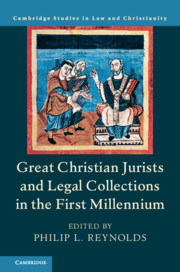Book contents
- Great Christian Jurists and Legal Collections in the First Millennium
- Law and Christianity
- Great Christian Jurists and Legal Collections in the First Millennium
- Copyright page
- Contents
- Contributors
- Preface and Acknowledgments
- Abbreviations
- Part I
- 1 Normative Texts and Practices of the First Millennium
- 2 The Many Voices of Roman Law
- 3 The Law of the Post-Roman Kingdoms
- 4 Ecclesiastical Councils
- 5 The Papacy
- 6 The Sacred Palace, Public Penance, and the Carolingian Polity1
- 7 Canonical Collections
- 8 The Practice and Literature of Penance
- 9 Monastic Rules
- Part II
- Index
- References
7 - Canonical Collections
from Part I
Published online by Cambridge University Press: 21 June 2019
- Great Christian Jurists and Legal Collections in the First Millennium
- Law and Christianity
- Great Christian Jurists and Legal Collections in the First Millennium
- Copyright page
- Contents
- Contributors
- Preface and Acknowledgments
- Abbreviations
- Part I
- 1 Normative Texts and Practices of the First Millennium
- 2 The Many Voices of Roman Law
- 3 The Law of the Post-Roman Kingdoms
- 4 Ecclesiastical Councils
- 5 The Papacy
- 6 The Sacred Palace, Public Penance, and the Carolingian Polity1
- 7 Canonical Collections
- 8 The Practice and Literature of Penance
- 9 Monastic Rules
- Part II
- Index
- References
Summary
With over seventy surviving texts, canonical collections appear to have been the most prevalent form of normative codification in the early medieval Latin West. Rather than being merely compilations of derivative material, the choices that were made in selecting the material and organizing it are important windows onto regional variation in doctrinal observance and in ecclesiastical governance. Canonical collections are also important sources for social history thanks to the preoccupation of many a collection with such matters of social significance as marriage, landholding, and the socially disadvantaged. This chapter includes a sketch of the development of these collections, insofar as a clear trajectory of development can be discerned. The account is broadly chronological, with a reflection on central themes that have punctuated the study of collections: their sources, their authority, their main concerns, the motivations for their compilation, and their impact.
Keywords
- Type
- Chapter
- Information
- Publisher: Cambridge University PressPrint publication year: 2019

